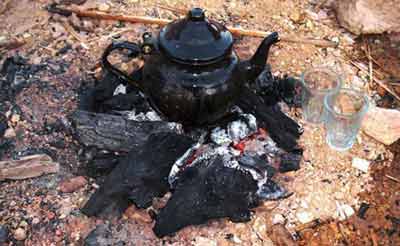Hello ladies and gents this is the Viking telling you that today we are talking about
Libyan Black & Green Tea

One of the most important social occasions in Libya is the daily session of tea drinking. Brings families together, to chat, laugh, discuss and gossip about the highlights of the day and about life in general. Talking in Libya is very important social activity; it firmly bonds the family.
Libyan tea is rather very strong, thick, syrup-like black tea. After boiling water in a traditional tea pot, one adds a handful of red tea leaves, and leaves to boil for a long time (ten to twenty minutes). Remove the pot from the fire, open the lid, add some sugar, and boil again for a few more minutes. The ready tea is then removed from the fire, left to settle for a few seconds, and served in small glasses (as shown in the photo). Normally this is prepared during a chat session, around which members of the family gather together to socialise for an hour or so before they each carry on with their own separate paths, and during which one drinks two rounds of tea (each round prepared as above and lasts about half an hour). The third round is served with roasted peanuts or roasted almonds (mixed with the tea in the same glass).
In special occasions and for those who still follow the old tradition, the tea is first poured into another mug, and then using two mugs, one continuously empties the content of one mug into the other and then back into the original mug for at least twenty or thirty times, to produce what the Libyans call reghwet or reghwa, which can be translated as froth or foam, which is steadily added to one glass at a time as being made.
After all the empty glasses are half-full with froth, the hot tea is poured over the froth and served hot. The trick to produce the froth is to lift one mug as high as possible, by stretching your arm over your head, while pouring the content into the other mug, and then repeat the process by lowering the raised hand and rising the other one, and so on until enough froth has been produced.
After meals, the Libyans traditionally always use green tea to aid digestion, and also help eliminate stomach problems after a heavy meal. It really does work. Green tea is better for you, especially when drank without milk. Adding milk destroys much of the powerful effects of its antioxidants.
One of the main components of tea are antioxidants. The process of oxidation in the human body causes damage to our cells. A free radical is a charged atom that steals an electron from a healthy cell in order to re-establish its own stability, leaving you with a bit of damaged DNA. Given time, the damage accumulates and as a result one ages faster or even dies quicker.
Now comes the important role of antioxidants. They talk to free radicals and say: hi, I have some free electrons, do you want some? The free radicals, being lazy, care less where the electrons come from and thus happily take up the free offer and spare your helpless, healthy cells the loss of much-needed electrons.
The process of oxidation is accelerated by pollution, alcohol and smoking, and therefore regular supply of green (or red) black tea and vitamins help keep the supply of antioxidants. Ask your Libyan guide to prepare some Libyan tea for you and taste the difference. The above photo is of a tea session we prepared for an Italian group while camping in the desert - in Adiri.
And as always have a chilled day from the Viking
Comments
Post a Comment